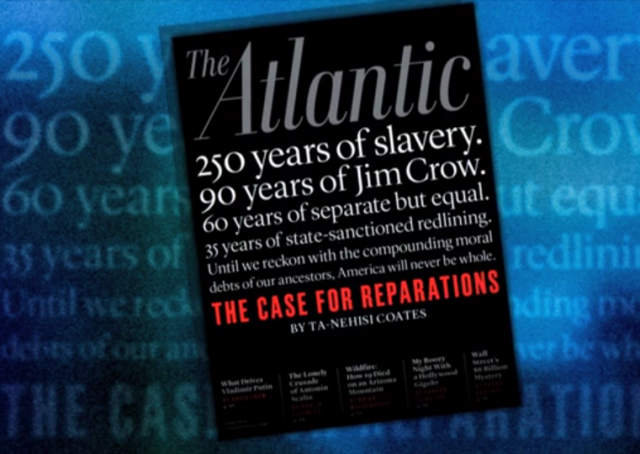The dead-end Case for Reparations
Ta-Nehisi Coates’ backwards looking road to nowhere.

The 15,000+ word essay by Ta-Nehisi Coates in The Atlantic, The Case for Reparations, is getting completely predictable reactions.
It’s looooong, which gives it a perceived weight which just is not there.
In fact, there’s not much new there, except for historical anecdotes shedding detail but not light on what we already knew to be the history of slavery, segregation and discrimination:
… the crime with which reparations activists charge the country implicates more than just a few towns or corporations. The crime indicts the American people themselves, at every level, and in nearly every configuration. A crime that implicates the entire American people deserves its hearing in the legislative body that represents them.
…. No one can know what would come out of such a debate. Perhaps no number can fully capture the multi-century plunder of black people in America. Perhaps the number is so large that it can’t be imagined, let alone calculated and dispensed. But I believe that wrestling publicly with these questions matters as much as—if not more than—the specific answers that might be produced. An America that asks what it owes its most vulnerable citizens is improved and humane. An America that looks away is ignoring not just the sins of the past but the sins of the present and the certain sins of the future. More important than any single check cut to any African American, the payment of reparations would represent America’s maturation out of the childhood myth of its innocence into a wisdom worthy of its founders.
Coates never gives the answer as to who gets what and how.
And that’s ultimately the problem with reparations arguments that are not based upon the people causing the harm paying the people directly harmed by specific conduct soon after the conduct is remedied.
If you can’t answer the question of why a Vietnamese boat person has to pay reparations for the conduct of white plantation owners more than a century earlier, then you can’t make the argument.
If you can’t answer the question of why two successful black doctors living in a fashionable suburb should get reparations paid for by the white children of Appalachia, then you can’t make the argument.
If you can’t answer the question of why the adult black recent immigrant from Paris should be pay or be paid reparations based on the color of his skin for crimes committed in a land he did not grow up in, then you can’t make the argument.
And what about the increasing number of children of mixed race?
And I could go on and on.
Ultimately, Coates’ argument is a dead end.
And he seems to recognize that. He wants a permanent inquisition, a guilt commission:
The popular mocking of reparations as a harebrained scheme authored by wild-eyed lefties and intellectually unserious black nationalists is fear masquerading as laughter. Black nationalists have always perceived something unmentionable about America that integrationists dare not acknowledge—that white supremacy is not merely the work of hotheaded demagogues, or a matter of false consciousness, but a force so fundamental to America that it is difficult to imagine the country without it….
What is needed is an airing of family secrets, a settling with old ghosts. What is needed is a healing of the American psyche and the banishment of white guilt.
What I’m talking about is more than recompense for past injustices—more than a handout, a payoff, hush money, or a reluctant bribe. What I’m talking about is a national reckoning that would lead to spiritual renewal. Reparations would mean the end of scarfing hot dogs on the Fourth of July while denying the facts of our heritage. Reparations would mean the end of yelling “patriotism” while waving a Confederate flag. Reparations would mean a revolution of the American consciousness, a reconciling of our self-image as the great democratizer with the facts of our history.
…. as if we have not been having that conversation and playing on that collective guilt for three generations.
And as if we have not thrown trillions at the problem, and sullied ourselves with engaging in more racism to remedy past racism.
And as if we live in a static world were it’s always 1863, or at best 1963, and people are captive victims to history, including history in which they did not participate.
While Coates article will be celebrated because it so much fits the mainstream liberal narrative, it’s ultimately a backwards looking road to nowhere.
(video via Colorlines)
 DONATE
DONATE
Donations tax deductible
to the full extent allowed by law.







